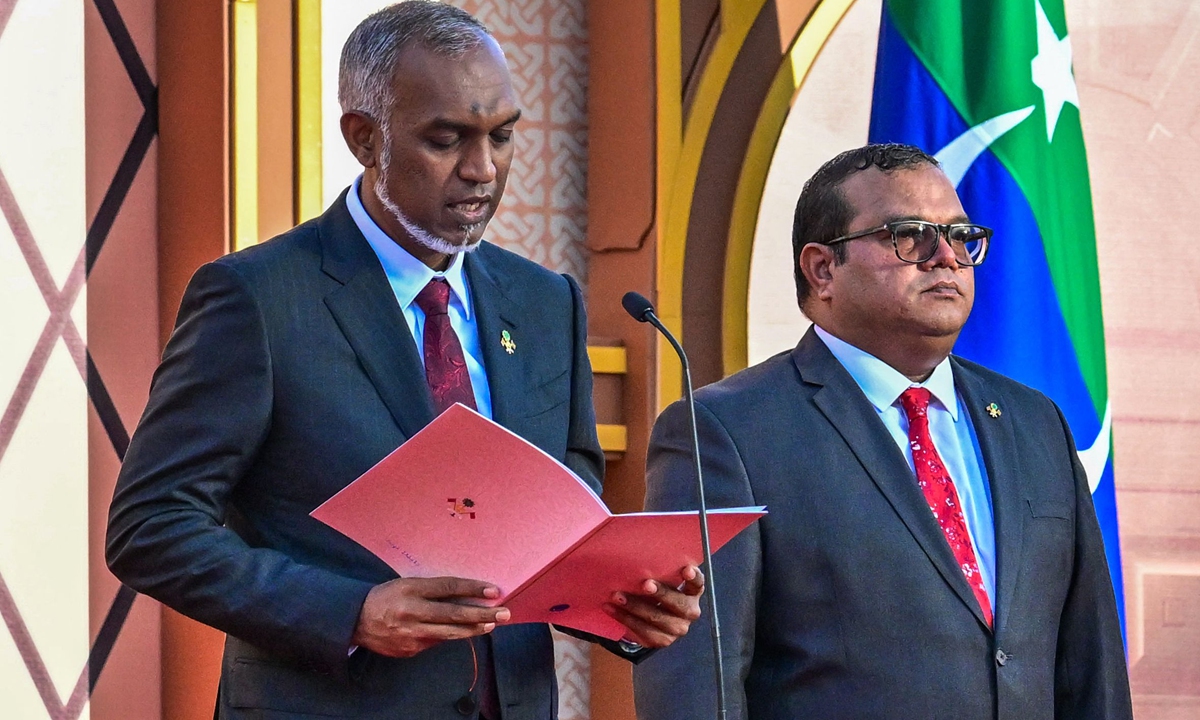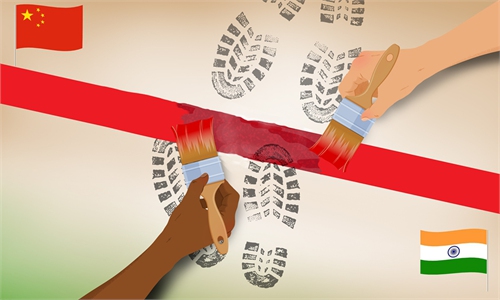Maldives asks India to withdraw military, expected to 'facilitate more independent and equal diplomacy'

Mohamed Muizzu (left) reads out the oath during his inauguration ceremony in Male on November 17, 2023. President Mohamed Muizzu of the Maldives vowed on November 17 to expel Indian troops deployed in the strategically located archipelago, in his first speech to the nation after being sworn into power. Muizzu was elected as the new president of the island nation after he won the presidential election on September 30, defeating the then-incumbent president Ibrahim Mohamed Solih. Photo: VCG
One day after Mohamed Muizzu was sworn in as the 8th president of the Maldives, the new leader, who campaigned on altering his country's "India first" policy, has asked India to withdraw its military from the country.
This request is seen by some Chinese analysts as a brave step forward for a more independent and equal diplomacy as well as inclusive and mutually beneficial cooperation with more countries, including China. The new head of the South Asian country is trying to safeguard national security and sovereignty despite the long-term and strong coercion from India, analysts noted.
"The Maldivian people had given him [Muizzu] a strong mandate to make the request to India and expressed the hope that India will honor the democratic will of the people of the Maldives," the president's office said in a statement on Saturday.
Muizzu made the request when India's Minister of Earth Sciences paid a courtesy call on the Maldivian president.
India's defense ministry did not immediately respond to a request for comment, according to Reuters on Sunday.
Muizzu won the presidential election in September after promising to remove a small Indian military presence of some 75 personnel, Reuters reported.
At his inauguration on Friday, the Maldivian president expressed his commitment to prioritizing the interests of the citizens of the Maldives, ensuring that no external country's interests will supersede those of the Maldives and its people, the Xinhua News Agency reported on Saturday. He elaborated on his vision for the Maldives' foreign policy, emphasizing the preservation of amicable relations with neighboring and distant countries.
Muizzu was elected as the new president of the island nation after he won the presidential election on September 30, defeating the then-incumbent president Ibrahim Mohamed Solih.
Muizzu's Indian troop withdrawal request reflects that the new government is trying to strike a diplomatic balance between its relations with India and other countries and regions, said Long Xingchun, a professor at the School of International Relations at Sichuan International Studies University.
Long explained that if India continues its military presence, the Maldives will not be able to engage in comprehensive and inclusive diplomacy with other countries. "[In that case,] Maldives will be constrained in its interactions with China and other countries," Long told the Global Times on Sunday.
But analysts refuted some Indian and Western media outlets which hyped that the Indian troop withdrawal request is to cater to China.
Some media outlets including the AP and Indian Express associated the request to the cooperation between the Maldives and China under the Belt and Road Initiative, suggesting that the move by the Maldives aims to lean toward China.
"This is their typical way of thinking and reporting. In fact, China's cooperation with the Maldives is inclusive, different from India's which is exclusive. China is more open and confident in its approach. We fully support India's cooperation with the Maldives," Long stressed.
He pointed out that India regards the South Asian region, where the Maldives, Sri Lanka, Nepal and Bangladesh are located, as its sphere of influence, which raises concerns about sovereignty and security for those South Asian countries.

